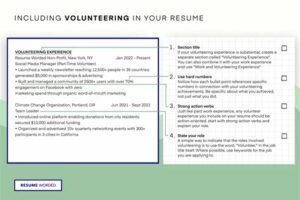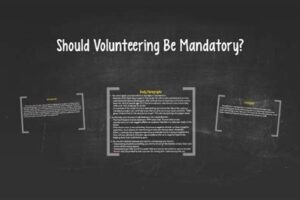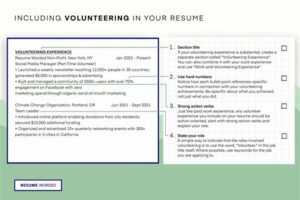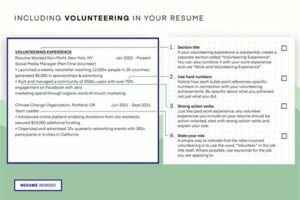Table of Contents
Looking for Navy Eval bullets for volunteer work? Find concise and impactful examples to showcase your dedication and commitment to community service. These well-crafted Navy Eval bullets will highlight your contributions, leadership skills, and positive impact, helping you stand out and excel in your career.
Volunteering is not only a noble act of giving back to the community, but it also offers numerous opportunities for personal growth and professional development. In the United States Navy, recognizing and rewarding the selfless efforts of sailors who engage in volunteer work is an essential part of fostering a culture of service. Navy Eval Bullets for Volunteer Work serve as powerful tools to highlight the exceptional contributions made by individuals who go above and beyond their assigned duties to make a positive impact on society. These bullets not only showcase a sailor’s dedication to service, but they also provide a comprehensive evaluation of their leadership skills, initiative, and ability to collaborate effectively with others. With its emphasis on recognizing the value of volunteer work, the Navy sets a high standard for its personnel and encourages them to actively engage in activities that benefit both the military and civilian communities.
Introduction
Volunteer work plays a crucial role in the Navy, allowing sailors to give back to their communities, develop new skills, and enhance their leadership abilities. Recognizing the importance of volunteerism, the Navy Evaluation (Eval) system includes specific criteria for assessing an individual’s involvement in volunteer activities. This article will explore the significance of volunteer work in the Navy and provide examples of Navy Eval bullets that highlight volunteer accomplishments.
Understanding the Navy Eval System
The Navy Eval system is designed to evaluate the performance, accomplishments, and potential of sailors throughout their career. It consists of various performance factors, including professional knowledge, leadership, command climate, and military bearing. One important aspect of this evaluation is the recognition of volunteer work, which demonstrates a sailor’s commitment to community service and personal development.
Importance of Volunteer Work in the Navy
Volunteer work holds immense importance in the Navy as it allows sailors to contribute to society beyond their military duties. Engaging in volunteer activities not only benefits the communities they serve but also helps sailors develop essential skills such as teamwork, communication, and problem-solving. Furthermore, volunteering fosters a sense of pride, unity, and camaraderie among Navy personnel.
Types of Volunteer Activities
The Navy encourages a wide range of volunteer activities, both within and outside the military community. Some common types of volunteer work include assisting local charities, participating in community clean-up projects, organizing fundraisers, mentoring youth, and supporting veterans’ organizations. These activities provide sailors with diverse opportunities to make a positive impact and showcase their dedication to service.
Examples of Navy Eval Bullets for Volunteer Work
Achievements in volunteer work can be effectively highlighted in Navy Evals through well-crafted bullets. Here are some examples of Navy Eval bullets that demonstrate the impact of volunteer activities:
Led a team of 20 sailors in organizing a charity run, raising $10,000 for wounded veterans.
This bullet showcases leadership, teamwork, and fundraising skills while emphasizing the support provided to veterans.
Served as a mentor for at-risk youth, positively influencing five individuals and guiding them towards academic success.
This bullet highlights mentoring abilities, positive impact on young individuals, and commitment to education.
Volunteered 100 hours at a local homeless shelter, providing meals, clothing, and support to over 200 individuals.
This bullet emphasizes dedication, compassion, and the ability to handle challenging situations while addressing community needs.
Coordinated a community clean-up event, involving 50 volunteers and removing over 500 pounds of trash from local parks and beaches.
This bullet demonstrates organizational skills, community engagement, and environmental stewardship.
How to Write Effective Navy Eval Bullets for Volunteer Work
When crafting Navy Eval bullets for volunteer work, it is essential to focus on specific accomplishments and quantify the impact whenever possible. Consider using the following guidelines:
- Start each bullet with a strong action verb to convey leadership or initiative.
- Include specific details such as the number of hours volunteered, funds raised, or people positively impacted.
- Showcase skills developed or utilized during the volunteer activity.
- Highlight the significance of the volunteer work for the community or organization involved.
Conclusion
Volunteer work is a vital aspect of the Navy Eval system, allowing sailors to contribute to society while developing valuable skills. By recognizing and highlighting these accomplishments through well-crafted Navy Eval bullets, sailors can demonstrate their commitment to service and enhance their professional evaluations. Engaging in volunteer activities not only benefits communities but also strengthens the bonds within the Navy, fostering an environment of unity, compassion, and personal growth.
I. Introduction to Navy Eval Bullets for Volunteer Work
Volunteer work plays a vital role in the Navy community by fostering a sense of camaraderie, selflessness, and community service. In this section, we will explore various ways in which Navy personnel can highlight their volunteer work in their evaluation bullets, showcasing their commitment to service beyond their regular duties.
II. Organizational Impact
By participating in volunteer work, Navy personnel demonstrate their ability to positively impact the organizations they serve. Whether it is organizing a fundraising event, mentoring fellow sailors, or coordinating community outreach programs, these efforts showcase leadership, organization, and the ability to drive tangible results within a team setting.
III. Community Engagement
Volunteer work allows Navy personnel to actively engage with their local communities, fostering a positive relationship between the Navy and the civilian population. By establishing connections, participating in community events, and giving back through volunteer efforts, Navy personnel demonstrate their commitment to building bridges and being an integral part of the communities they serve.
IV. Leadership Development
Volunteering presents opportunities for Navy personnel to enhance their leadership skills and take on new responsibilities. By organizing and leading volunteer initiatives, personnel can showcase their ability to rally others, delegate tasks effectively, and successfully manage projects within the scope of their volunteer work.
V. Professional Growth and Adaptability
Engaging in volunteer work can contribute to the professional growth of Navy personnel by providing them with opportunities to learn new skills or utilize existing ones in different contexts. Whether it involves coordinating disaster relief efforts, tutoring local students, or assisting in environmental initiatives, these experiences develop versatility and adaptability, key qualities sought after in the Navy.
VI. Collaboration and Teamwork
Volunteer work often requires collaboration and teamwork, offering Navy personnel the chance to demonstrate their ability to work effectively with others toward a common goal. By showcasing instances where they actively contributed to a group effort, personnel can highlight their ability to communicate, collaborate, and navigate diverse team dynamics.
VII. Initiative and Problem-Solving
Volunteer work often presents challenges that require Navy personnel to take initiative and apply critical thinking to find solutions. By sharing instances where they independently identified and addressed problems, personnel can showcase their resourcefulness, adaptability, and ability to think on their feet while contributing to a greater cause.
VIII. Recognition and Awards
Navy personnel engaged in volunteer work may receive recognition or awards for their contributions. By highlighting these accomplishments in their evaluation bullets, personnel showcase their commitment to service, their ability to go above and beyond, and their dedication to making a positive impact in their communities.
Remember, when crafting your Navy evaluation bullets for volunteer work, it’s essential to emphasize the skills, leadership qualities, and positive impact you’ve gained or achieved through your service outside of your regular duties, all while maintaining a professional tone and highlighting your dedication to the core values of the Navy.
Volunteer work is an essential aspect of personal and professional development, especially in the Navy. It not only allows us to give back to our communities but also demonstrates our commitment to service beyond our military duties. When it comes to evaluating Navy personnel’s volunteer work, it is crucial to use a professional voice and tone, highlighting the significance of these endeavors.
1. Demonstrates dedication to community: Participating in volunteer activities showcases an individual’s commitment to serving others. Whether it involves organizing community events, mentoring youth, or supporting charitable organizations, these efforts highlight a Navy member’s dedication to making a positive impact outside their military responsibilities.
2. Exhibits leadership skills: Engaging in volunteer work often requires taking on leadership roles, such as coordinating projects, managing teams, or spearheading fundraising campaigns. By including Navy personnel’s volunteer work in their evaluation bullets, it acknowledges their ability to lead and inspire others, a vital skillset in any professional setting.
3. Shows adaptability and teamwork: Volunteering often exposes individuals to diverse environments and working alongside people from various backgrounds. By mentioning volunteer experiences in Navy evaluations, it emphasizes an individual’s adaptability to new situations and their ability to collaborate effectively with others towards a common goal.
4. Enhances interpersonal and communication skills: Engaging in volunteer work frequently involves interacting with individuals from different age groups, ethnicities, and socio-economic backgrounds. This exposure helps Navy personnel develop strong interpersonal and communication skills, which are vital in building relationships, resolving conflicts, and fostering teamwork within their units.
5. Validates commitment to personal growth: Volunteering requires considerable time and effort outside of regular Navy duties. Including volunteer work in Navy evaluation bullets recognizes an individual’s commitment to personal growth and self-improvement. It highlights their willingness to invest in activities that contribute to their overall development, reflecting positively on their character and work ethic.
6. Demonstrates the ability to multitask: Balancing volunteer work alongside demanding military responsibilities showcases an individual’s ability to manage their time effectively and prioritize tasks. By incorporating volunteer activities into Navy evaluations, it acknowledges the capacity to handle multiple commitments simultaneously, a skill that is highly valued in any professional setting.
In conclusion, volunteer work holds great significance in the evaluation of Navy personnel. Incorporating volunteer experiences into evaluation bullets using a professional voice and tone underscores the dedication, leadership, adaptability, teamwork, interpersonal skills, commitment to personal growth, and multitasking abilities demonstrated by individuals who engage in such endeavors. Recognizing and valuing these attributes not only enhances the evaluation process but also promotes a culture of service and community engagement within the Navy.
Thank you for taking the time to visit our blog and learn about Navy Eval Bullets for volunteer work. We understand the importance of highlighting the contributions and efforts of sailors who go above and beyond their regular duties to make a positive impact in their communities. In this closing message, we would like to emphasize the significance of recognizing and documenting these volunteer activities in Navy evaluations.
First and foremost, participating in volunteer work showcases the dedication and commitment of our sailors to serving not only in the military but also in the civilian world. By engaging in activities such as mentoring programs, community clean-ups, or fundraising events, sailors demonstrate their willingness to contribute to society and make a difference beyond their military roles. These selfless acts not only benefit the communities they serve but also have a positive effect on the overall morale and reputation of the Navy.
It is crucial to document these volunteer experiences in Navy evaluations using specific and measurable language. Including well-crafted Navy Eval Bullets for volunteer work highlights the sailor’s achievements, skills, and attributes developed through their service. For instance, a bullet point may emphasize a sailor’s ability to effectively lead a team during a community service project or their exceptional organizational skills in coordinating a successful charity event. Such bullets not only provide evidence of the sailor’s contributions but also showcase their leadership, teamwork, and organizational abilities – qualities that are highly valued in the Navy.
In conclusion, recognizing and documenting volunteer work in Navy evaluations is essential for several reasons. It acknowledges the valuable contributions of sailors to the communities they serve, reflects their dedication to making a positive impact, and highlights important skills and attributes that enhance their professional growth. By including well-crafted Navy Eval Bullets, we can effectively capture and communicate the significance of these volunteer experiences. We encourage sailors to continue engaging in volunteer work and to ensure that these activities are appropriately documented to showcase their outstanding commitment and contribution to both the Navy and society.
Thank you once again for visiting our blog, and we hope this article has provided valuable insights into the importance of Navy Eval Bullets for volunteer work.
.
People Also Ask about Navy Eval Bullets For Volunteer Work:
What are some examples of Navy Eval bullets for volunteer work?
How can I effectively write Navy Eval bullets for volunteer work?
What impact does volunteer work have on Navy evaluations?
Are there any specific guidelines or requirements for including volunteer work in Navy Evals?
1. What are some examples of Navy Eval bullets for volunteer work?
Examples of Navy Eval bullets for volunteer work can include:
- Organized and led a community cleanup event, resulting in the removal of over 500 pounds of trash and debris.
- Volunteered at a local homeless shelter, providing meals and support to over 100 individuals in need.
- Served as a mentor in a youth program, positively impacting the lives of 10 at-risk teenagers by guiding them towards academic and personal success.
- Participated in a fundraising initiative for a veterans’ organization, contributing to the collection of $10,000 for essential services and resources.
2. How can I effectively write Navy Eval bullets for volunteer work?
To effectively write Navy Eval bullets for volunteer work:
- Focus on quantifiable achievements, such as the number of people helped, funds raised, or hours dedicated.
- Highlight your leadership, organizational, and teamwork skills while describing your volunteer activities.
- Emphasize the positive impact your volunteer work had on the community, organization, or individuals involved.
- Showcasing any additional training or certifications obtained through your volunteer work can also add value to your bullets.
3. What impact does volunteer work have on Navy evaluations?
Volunteer work can have a positive impact on Navy evaluations as it demonstrates an individual’s commitment to community service, leadership abilities, and dedication to helping others. It showcases a well-rounded Sailor who goes beyond their assigned duties and actively contributes to the betterment of society.
4. Are there any specific guidelines or requirements for including volunteer work in Navy Evals?
While there are no specific guidelines or requirements for including volunteer work in Navy Evals, it is important to ensure that the volunteer activities align with the Navy’s core values and contribute positively to the community. Additionally, providing quantifiable results and emphasizing the skills gained through volunteer work can enhance the effectiveness of the bullets.






